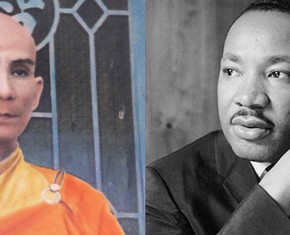The views expressed in our content reflect individual perspectives and do not represent the authoritative views of the Baha'i Faith.
What makes us moral beings? Why do we humans want to do good in the world, after all, if it benefits others and not themselves?
These questions go to the very core of who we are. Are we completely self-interested, only looking out for our own good—or are we essentially selfless, willing to sacrifice our own comfort and well-being for the well-being of others?
Toward that end, a short decision table of our potential choices in life might look something like this:
- Lie, or Tell the truth (kindly)
- Hate others, or love others for themselves
- Bully and exploit others, or care for others
- Hurt other people, or serve them
- Be kind and compassionate, or hard and cold.
We’re all faced with these kinds of essentially moral choices—and the list goes on—every day of our lives.
Now, admittedly, it is incredibly hard and takes extensive training to break one’s ingrained bad habits and convert them to good ones, or to exterminate them altogether. That’s where religion can help.
Most of us fall somewhere on an all-too-human spectrum, where we might have actually made poor moral choices in the past, learned from our mistakes, and then tried to rectify them. The Baha’i teachings convinced me to put my bad behaviors behind me. If fortunate, as we grow up we should have learned that doing potentially harmful things generates harmful consequences—to others, and to ourselves. That knowledge, though, may not be enough on every occasion.
To be realistic, sometimes we lie, or cheat, or hurt others in word or deed whether consciously or unconsciously, seeking our own advantage. We are not perfectly good, no matter how hard we try. That station is reserved for the prophets and messengers of God, the saints and others who have mastered their own inclinations and control their words and actions to a perfect extent. They are our examples.
For Baha’is, Abdu’l-Baha is the moral exemplar of the teachings. He urged us to be like little children with purity of motive looking at this wondrous world as a training ground for becoming better:
The disinterested actions and free-hearted deeds of a person proclaim with the sound of a trumpet his loyalty and sincerity … He is in no need of self-justification. He lives above and beyond the criticism of petty and dwarfed assailers of his integrity and purity of motives. Their censure does not touch him. The innate nobility of his soul is not tarnished, the glories of his work are not beclouded. The river of his spiritual ideality, creative power and imaginative faculty is not dried up. The sea of his sympathy and increasing hopefulness and direct activity in the Cause is not calmed down. With a deep insight, holy vision and fresh inspiration he will cause the complete retreat of all his old enemies. With zest, unfailing courage and undisturbed spirit he will apply himself to new victories in channels of service, broader fields of labour, higher planes of triumph and the solution of vaster and more intricate problems by the magic wand of his determination. Thus he changes every stumbling block placed in his path to dishearten him from further progress into a stepping stone, advances with confident steps, ever rising higher, never looking backward but always forward, setting aside imperturbably all the seeming difficulties and finally planting his feet on the summit of the mountain of success, beatitude and undiminished glory. – Abdu’l-Baha, Star of the West, Volume 5, p. 66.
We all play many parts and wear different hats. But today, as in the past, the followers of the Baha’i teachings are called to a high standard. They have all been enjoined to be pure, honest, helpful, caring, and loving servants of humanity.
The holy books are replete with exhortations urging humans to achieve their higher, saintly nature, and to put away their lower, animalistic and sometimes satanic nature. As humans, our dual natures are well documented—just look at any news reports and see the evil that’s perpetrated versus the good.
Baha’u’llah’s words capture the heart of the matter, and explain how humanity can transform themselves from bodies of clay to spirits with wings:
Is it within human power … to effect in the constituent elements of any of the minute and indivisible particles of matter so complete a transformation as to transmute it into purest gold? Perplexing and difficult as this may appear, the still greater task of converting satanic strength into heavenly power is one that We have been empowered to accomplish. The Force capable of such a transformation transcendeth the potency of the Elixir itself. The Word of God, alone, can claim the distinction of being endowed with the capacity required for so great and far-reaching a change. – Gleanings from the Writings of Baha’u’llah, p. 200.
In his letter called The Advent of Divine Justice, the Guardian of the Baha’i Faith, Shoghi Effendi, cited some of the societal forces that prevent us from achieving that transcendence: “…an excessive and binding materialism,” “a heedless generation,” “Immersed in a sea of materialism,” “racial prejudice,” “political corruption,” lawlessness,” and “laxity in moral standards.” Who was he talking about? He wrote his 77-page letter in December of 1938, addressing the Baha’is in the United States and Canada and the conditions in their countries. Surprised? I was—because the conditions 80 years ago are still true today.
How does a person extricate him or herself from these everyday influences? Do we seclude ourselves in a remote town or village, or become hermits, or retreat to a mountain sanctuary? No, we do not have that luxury—so what can we do to achieve the purity the Baha’i teachings recommend, while living in such a corrupt society?
In Part Two, let’s delve into what constitutes spiritual prerequisites, and how we might achieve them.
















Comments
Sign in or create an account
Continue with Googleor